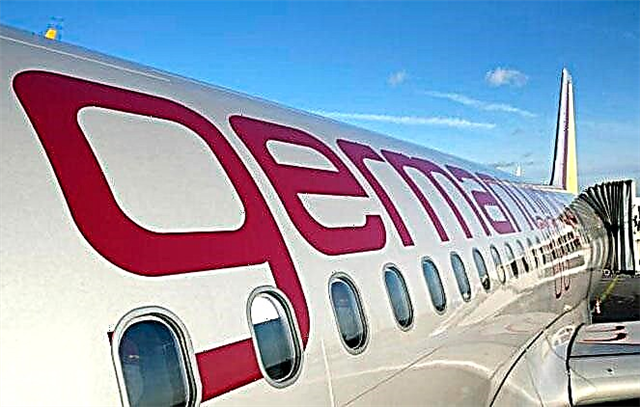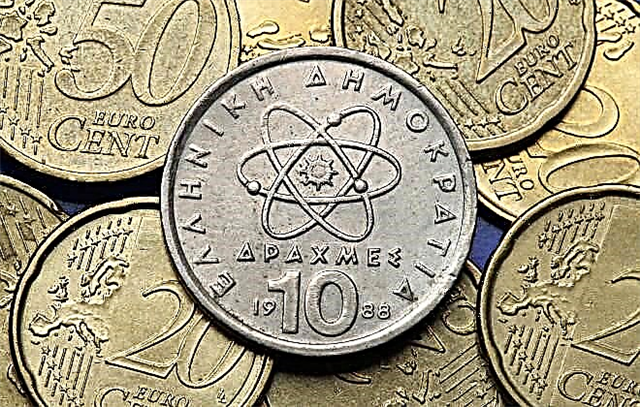Greece is considered one of the world's major tourism centers. It is interesting for its ancient history, legends, unique architecture, excellent climatic conditions. Tourists not only need a visa, they have to use local money. The currency of Greece today is the euro. However, it is possible that the country may return to the drachma in order to mitigate the financial crisis. The real probability of giving up euro money is close to zero. The Greeks themselves are in favor of such a decision, respecting their national currency, which appeared several millennia ago.
History of Greek money
The first evidence of the minting of Greek coins dates back to the 7th century BC. In the policies, and later in the Hellenistic states, the drachma was used as a monetary unit. Perhaps the Greek currency has one of the oldest names that have survived to this day (in Arab countries it is called “dirham”).
According to one version, the name comes from the ancient Greek word "handful", according to the other - from the Assyrian "darag-mana", meaning the sixtieth part of the mine ─ the Sumerian measure of weight.
On the mainland, islands and colonies, their own silver coins were minted, differing in weight. There were also fractional units ─ obol and lepta.
Other Greek coins are also known before the euro. For example, with the symbolic name "Phoenix", which became the first currency after independence in 1828. In February 1833, by decree of King Otto, the drachma received a new life.
With the entry of Greece into the European Union, starting in 2001, “Greek euros” with a unique design began to come into circulation. The "national" sides depict sea vessels, historical and cultural figures, symbols of history and mythology. From that moment on, the answer to the question of which currency is currently used in Greece is the euro. An interesting fact is that the historical name - mite - has been preserved on the back of the euro cent.
Money turnover
Greece is a modern European country with free circulation of cash and non-cash currency. There are 24-hour ATM machines even in villages. Since 2021, a law has come into force in the country obliging all points of payment for goods and services to use banking (POS) terminals.
Payment by card in Greece is available almost everywhere, even in the smallest shops. Diners Club and American Express cards are also readily accepted here.
MasterCard is more profitable because it is pegged to the euro, which automatically eliminates the need for conversion when calculating and withdrawing money. If the card is personalized, but without a photo, they may ask for a passport. There are no restrictions, as in the entire European Union.
If the card is in rubles, the commission may surprise you unpleasantly. Conversion and withdrawal fees can be expensive.
With what currency to go to Greece, you decide, but in general there is nothing to do with rubles. It is better to stock up on euro of small denomination, because it is more convenient to pay with them without change. In addition, when paying in cash, it is easier to get a discount.
It is also worth considering that banknotes of 100 euros and more are more often counterfeited.
Exchange rate
Exchange rate differences can cloud the trip. Today it is not at all a problem to study in detail the exchange rate in Greece before the trip. It is enough just to fill in a request into any search engine and select a site with a converter. To be completely sure, you should enter the website of the Central Bank of the Russian Federation, the National Bank of Greece (www.nbg.gr) or the Greek branch of the Eurobank (www.eurobank.gr) and inquire about the course. For today, you need to pay about 75 rubles for 1 euro.
In the hotel, the conversion table must be at the reception. Here you can immediately exchange money, only the rate will be worse.
The exchange is carried out at specialized points, bank branches, even at the post office. Major resorts have vending machines that accept US dollars, most European currencies, Australian dollars and Japanese yens. The commission varies within 1-2% of the amount, in round-the-clock machines it can reach 4-5%.
Bank branches are usually open from 8.00 to 14.30. On weekends, exchanging dollars for euros in Greece is difficult. In the resort areas, with the beginning of the tourist season, exchange is offered in the afternoon until 21.00.
A passport may be required. The best place is Euro ExCheinge points that accept fifty world currencies. There are about three dozen branches in the country, including in cities:
- Athens;
- Thessaloniki;
- Piraeus.
And also on the islands:
- Rhodes;
- Mykonos;
- Santorini;
- Kos.
There is also a currency exchange at the Athens International Airport Eleftherios Venizelos.
Tax and duty free
Regardless of what you used to buy in Greece - dollars or euros, you will have to take into account the value added tax. VAT has three rates here:
- standard for 90% of goods and services ─ 23%;
- reduced for certain types of food, transport services - 13%;
- for essential goods, including printed publications, medicines, theater tickets, and hotel accommodation ─ 6.5%.
In a number of regions, tax incentives of 30% are available to entrepreneurs for each of the rates, but this does not affect tourists and buyers. But there is a possibility of VAT refund.
Two years ago, the country's government significantly lowered the minimum amount for goods purchased in Greece. You can issue a refund today for purchases in the amount of 50 euros or more. Benefit available to non-EU citizens over 18 years of age.
Having made a purchase in a Tax Free store (must be marked with a logo) with a personal receipt (passport required), you can get up to 23% of the cost back (for purchases on some islands, for example, Rhodes, only 17%). The minimum purchase price in one store must be from 120 euros. This is especially true when purchasing locally produced fur coats, other expensive goods, and luxury goods.
To refund VAT, you must request a Tax Free check at the checkout, in which all the necessary items must be filled in: name, surname, country of residence, home address, passport number and the amount of VAT refundable. This check must be attached to the sales receipt.
The further algorithm of actions is as follows:
- Submit the receipt and things for inspection at the customs point designated Tax Free. The labels must be in place, the packaging must be intact.
- Make sure that the receipt is stamped and the name of the customs officer is noted. The check is valid for 90 days.
- Get money in a convenient way:
- in cash at the point of return (at the airport);
- to a bank card (in this case, the account details should be immediately indicated on the check while still in the store). Funds are received within five weeks;
- at the Global Refund office upon returning to Russia or at a bank branch (for example, VTB).
The procedure can be very long, so you should schedule the time so that everything is done and not be late for your flight. Better to arrive a couple of hours earlier.
The completed stamped receipt can be sent to the document processing center and returned to the card. If you cannot do everything on the spot, within 90 days you need to enter the EU and leave through any checkpoint and repeat the operation. Items must be packed with all tags.
Customs regulations
The national currency in Greece is protected at the legislative level. The country has the customs rules of the European Union, introduced by the EU regulation No. 1889/2005. The main provisions are as follows:
- The import into the country of funds over 10 thousand euros without declaration is not allowed. This applies not only to cash, but also traveller's checks, money orders, securities, including bearer securities, as well as assets in the form of precious metals and stones. Requires the provision of documents confirming the origin and further use (sale, illegal traffic excluded).
- Duty-free import of funds by air: for an adult ─ 430 euros, for a child under 15 years old ─ 150.
- Export in the equivalent of more than $ 2.5 thousand without an import declaration is prohibited.
Answers to common questions
We offer a short set of practical tips that will be useful to travelers to this amazing country. So let's start in order.
- What currency is better to take to Greece? The answer is unequivocal ─ euro. The denomination does not matter, although the stock should be varied. The country is part of the eurozone, so this is the best option for a trip. It is not entirely reasonable to take pounds, dollars or something else with you, because they will have to be changed at an unfavorable rate. They don't like foreign currency in Europe. Moreover, the ruble, which, unfortunately, has not yet been converted in any way. It is better to change it at home before traveling. The official currency in Crete and other islands is the same as that of Greece.
- What is better to take to Greece: a bank card or cash? Better both. Moreover, a credit card is better if you intend to rent a car. You can pay with the card anywhere and for anything with a minimum commission or without it. At the same time, you do not have to worry about exchange for change or wallet security. Otherwise, the cache will help out. Take with you a card with euros on your account, the same amount of cash, including small coins and banknotes.
- Is it possible to pay with dollars in Greece? The Greeks do not respect the American currency. In any case, they pretend that they do not want to take it. You won't be able to pay for a purchase in a reputable store. The factory will probably be able to agree on the payment for the fur coat. They will take dollars in a taxi, in the market, on a private beach, in a cafe, a bar. Perhaps in a hotel, but the course will be draconian. It is basically impossible to pay in dollars in public transport.
- Can I pay with a Sberbank card in Greece? If it's Visa or MasterCard, no problem.
- How much money do you need to take to Greece? It depends on personal goals and requests, the duration of the trip, the level of the hotel, the average bill in the restaurants and shops visited, and the richness of the entertainment program.
Conclusion
At the end, we note at least. On average, a tourist will have enough € 50 per day per person for life and sightseeing in 2021. Prices in Greece are European despite the crisis. The Greeks love (and know how!) To bargain, plastic cards are accepted without a murmur, they give back their change. But it is better to prepare a trifle in advance. The most popular banknotes in Greece are in denominations of 5 and 10 euros.











